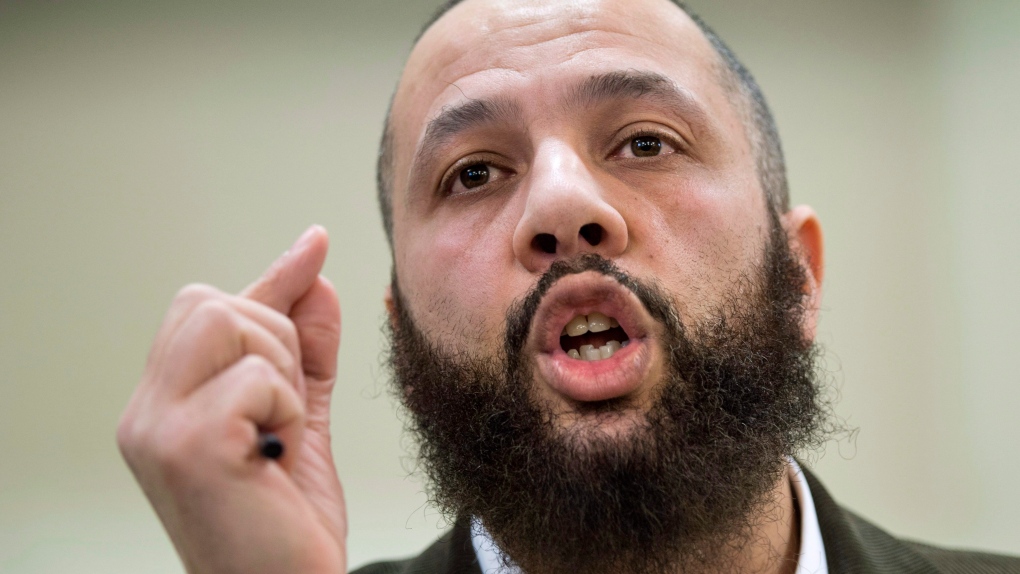No charges for Montreal imam who delivered speech at pro-Palestinian rally
 Adil Charkaoui makes a point during a news conference Friday, February 27, 2015 in Montreal. THE CANADIAN PRESS/Paul Chiasson
Adil Charkaoui makes a point during a news conference Friday, February 27, 2015 in Montreal. THE CANADIAN PRESS/Paul Chiasson
Quebec's Crown prosecution office said it will not lay charges against a Montreal imam following comments he made at a pro-Palestinian rally last fall.
In November, the RCMP confirmed to CTV News that it had opened an investigation into Adil Charkaoui over a speech he delivered at a rally following the Israel-Hamas war. During the rally, he allegedly prayed to God to "take care" of the Israelis, according to a translation obtained by The Canadian Press.
The RCMP's Integrated National Security Enforcement Team (INSET) led the investigation and sent the file to Quebec's Directeur des poursuites criminelles et pénales (DPCP) to determine whether criminal charges should be laid against the man.
On Thursday, the DPCP said in a statement that "after a rigorous analysis of the available evidence … it does not reveal the commission of a criminal offence."
On Nov. 6, an official complaint was filed with Montreal police, who referred the case to the national police force. The complaint centred on remarks made on Oct. 14 and 28 of last year "in the context of the war between Israel and Hamas."
At the time, Premier François Legault called for the police to investigate, telling reporters, "It's clear that this is incitement to hatred, to violence." Opposition party leaders also accused the imam's speech of crossing a line.
The Criminal Code defines public incitement of hatred as making a statement in public that "incites hatred against any identifiable group where such incitement is likely to lead to a breach of the peace."
The DPCP said Thursday that the complaint was reviewed by a panel of three criminal prosecutors, who concluded that "the evidence does not prove beyond a reasonable doubt that the words spoken constitute incitement to hatred against an identifiable group within the meaning of the applicable provision of the Criminal Code, as interpreted by the courts."
"It is not the role of the DPCP to pronounce on the social acceptability of public speech, but rather to determine whether a criminal act has been committed. Given the independence of the DPCP from political considerations, the decision not to lay charges cannot be interpreted as taking a position in the current socio-political context," the statement reads.
Prosecutors must also be guided by the principle of a reasonable prospect of conviction when determining whether or not to lay a criminal charge, it said, adding that "each case submitted to the DPCP is analyzed rigorously and impartially."
CTVNews.ca Top Stories

B.C. serial killer Robert Pickton dead following prison attack
Convicted B.C. serial killer Robert Pickton, who preyed on women he lured from Vancouver's Downtown Eastside to his rural pig farm, has died.
'We will go with the majority': Liberals slammed by opposition over proposal to delay next election
The federal Liberal government learned Friday it might have to retreat on a proposal within its electoral reform legislation to delay the next vote by one week, after all opposition parties came out to say they can't support it.
Ex-husband charged with murder in death of Lumby, B.C., woman
The ex-husband of Tatjana Stefanski – the woman whose disappearance and death set the small town of Lumby, B.C., on edge last month – has been charged with her murder.
Oilers beat Stars, one win away from Stanley Cup berth
Ryan Nugent-Hopkins scored two power-play goals as Edmonton smothered the Dallas Stars 3-1 to take a 3-2 lead in the NHL's Western Conference final on Friday.
Baby dead after being delivered via emergency C-section to woman who was in police custody
A newborn is dead after being delivered via emergency C-section to a woman in police custody.
Jennifer Lopez cancels summer tour: 'I am completely heartsick and devastated'
Jennifer Lopez has cancelled her 2024 North American tour, representatives for Live Nation confirmed to The Associated Press.
This Calgary home has a giant tree in the middle, and it's for sale
There's a luxury 'tree home' for sale in Calgary.
DND moving 1,000 employees out of Ottawa office building due to safety concerns
The Department of National Defence is moving approximately 1,000 employees out of an office building in Ottawa's Lowertown neighbourhood, citing safety concerns for its employees.
Man convicted of killing Toronto cop in 1980 granted day parole
A man convicted of murdering a Toronto police officer more than four decades ago has been granted day parole for six months.
































